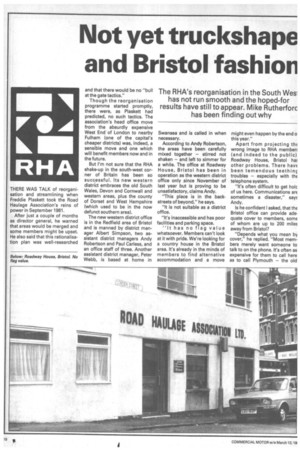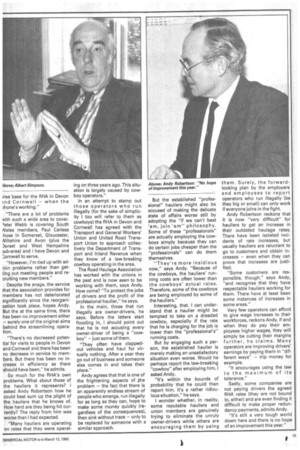Not yet truckshape and Bristol fashion
Page 20

Page 21

If you've noticed an error in this article please click here to report it so we can fix it.
THERE WAS TALK of reorganisation and streamlining when Freddie Plaskett took the Road Haulage Association's reins of power in September 1981.
After just a couple of months as director general, he warned that areas would be merged and some members might be upset. He also said that this rationalisation plan was well-researched and that there would be no "bull at the gate tactics."
Though the reorganisation programme started promptly, there were, as Plaskett had predicted, no such tactics. The association's head office move from the absurdly expensive West End of London to nearby Fulham (one of the capital's cheaper districts) was, indeed, a sensible move and one which will benefit members now and in the future.
But I'm not sure that the RHA shake-up in the south-west corner of Britain has been so successful. Its new western district embraces the old South Wales, Devon and Cornwall and western areas, plus the county of Dorset and West Hampshire (which used to be in the now defunct southern area).
The new western district office is in the Redfield area of Bristol and is manned by district manager Albert Simpson, two assistant district managers Andy Robertson and Paul Carless, and an office staff of three. Another assistant district manager, Peter Webb, is based at home in Swansea and is called in when necessary.
According to Andy Robertson, the areas have been carefully mixed together — stirred not shaken — and left to simmer for a while. The office at Roadway House, Bristol has been in operation as the western district office only since November of last year but is proving to be unsatisfactory, claims Andy.
"This place is in the backstreets of beyond," he says.
"It is not suitable as a district office.
"It's inaccessible and has poor facilities and parking space.
"It has no flag value whatsoever. Members can't look at it with pride. We're looking for a country house in the Bristol area. It's already in the minds of members to find alternative accommodation and a move might even happen by the end o this year."
Apart from projecting thE wrong image to RHA members (and indeed to the public) Roadway House, Bristol has other problems. There have been temendous teethinc troubles — especially with thE telephone system.
"It's often difficult to get holc of us here. Communications arE sometimes a disaster," says Andy.
Is he confident I asked, that the Bristol office can provide adequate cover to members, some of whom are up to 200 miles away from Bristol?
"Depends what you mean by cover," he replied. "Most members merely want someone to talk to on the phone. It's often as expensive for them to call here as to call Plymouth — the old irea base for the RHA in Devon Ind Cornwall — when the )hone's working."
"There are a lot of problems vith such a wide area to cover. 'eter Webb is covering South Nales members, Paul Carless hose in Somerset, Gloucester, Niltshire and Avon (plus the )orset and West Hampshire sub-area) and I have Devon and :ornwall to serve.
"However, I'm tied up with admin problems rather than getting out meeting people and recruiting new members."
Despite the snags, the service that the association provides for members has not deteriorated significantly since the reorganisation took place, hopes Andy. But the at the same time, there has been no improvement either — surely one of the original aims behind the streamlining operation.
"There's no decreased potential for visits to people in Devon and Cornwall and there has been no decrease in service to members. But there has been no increase in efficiency as there should have been," he admits.
So much for the RHA's own problems. What about those of the hauliers it represents? I asked Andy Robertson how he could best sum up the plight of the hauliers that he knows of. How hard are they being hit currently? The reply from him was worse than I had expected.
"Many hauliers are operating on rates that they were operat ing on three years ago. This situation is largely caused by cowboy operators."
In an attempt to stamp out those operators who run illegally (for the sake of simplicity I too will refer to them as cowboys) the RHA in Devon and Cornwall has agreed with the Transport and General Workers' Union and United Road Transport Union to approach collectively the Department of Transport and Inland Revenue when they know of a law-breaking cowboy operating in the area.
The Road Haulage Association has worked with the unions in the past and is now seen to be working with them, says Andy. How come? "To protect the jobs of drivers and the profit of the professional haulier," he says.
In the main, those that run illegally are owner-drivers, he says. Before the letters start flooding in, I should point out that he is not accusing every owner-driver of being a "cowboy" — just some of them.
"They often have clappedout vehicles and haul for virtually nothing. After a year they go out of business and someone else comes in and takes their place."
Andy agrees that that is one of the frightening aspects of .the problem — the fact that there is an apparently endless stream of people who emerge, run illegally for as long as they can, hope to make some money quickly (regardless of the consequences), then sink without trace — only to be replaced by someone with a similar approach. But the established "professional" hauliers might also be accused of making the delicate state of affairs worse still by adopting the "if we can't beat 'em, join 'em" philosophy. Some of these "professionals" are actually employing the cowboys simply because they can do certain jobs cheaper than the "professionals" can do them themselves.
"They're more insidious now," says Andy. "Because of the cowboys, the hauliers' running costs are often lower than the cowboys' actual rates. Therefore, some of the cowboys are being employed by some of the hauliers."
Interesting, that. I can understand that a haulier might be tempted to take on a dreaded cowboy, especially if the rate that he is charging for the job is lower than the "professional's" running costs.
But by engaging such a person, the established haulier is merely making an unsatisfactory situation even worse. Would he perhaps report the law-breaking "cowboy" after employing him, I asked Andy.
"It's within the bounds of probability that he could then report him. It's a rather ridiculous situation," he says.
I wonder whether, in reality, some reputable hauliers and union members are genuinely trying to eliminate the unruly owner-drivers while others are encouraging them by using them. Surely, the forwardlooking plan by the employers and employees to report operators who run illegally (be they big or small) can only work if everyone joins in the fight.
Andy Robertson reckons that it is now "very difficult" for hauliers to get an increase in their outdated haulage rates. There have been isolated incidents of rate increases, but usually hauliers are reluctant to go to customers and obtain increases — even when they can prove that increases are justified.
"Some customers are responsible, though," says Andy,, "and recognise that they have respectable hauliers working for them. There have at least been some instances of increases in some areas."
Very few operators can afford to give wage increases to their workforces, reckons Andy. If and when they do pay their employees higher wages, they will simply be cutting their margins further, he claims. Many operators are improving drivers' earnings by paying them in "different ways" — trip money for example.
"It encourages using the law to the maximum of its tolerance."
Sadly, some companies are not paying drivers the agreed RHA rates (they are not bound to, either) and are even finding it difficult to make proper redundancy payments, admits Andy.
"It's still a very tough world down here and there is no hope of an improvement this year."




























































































